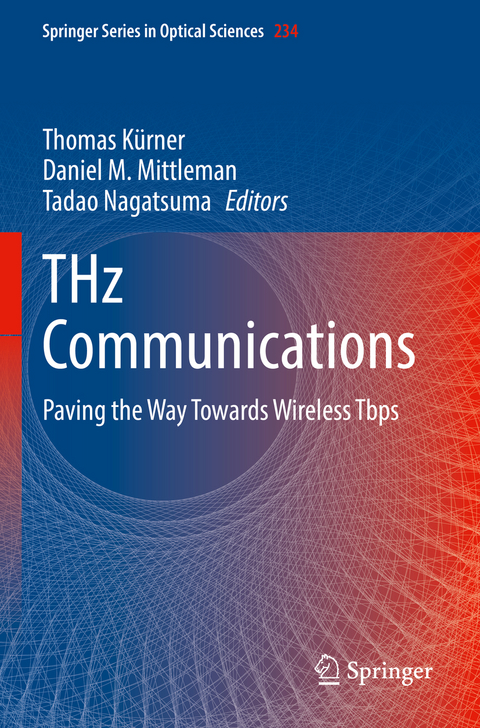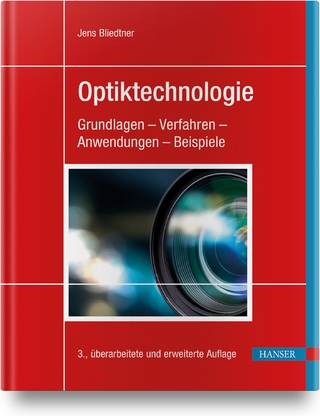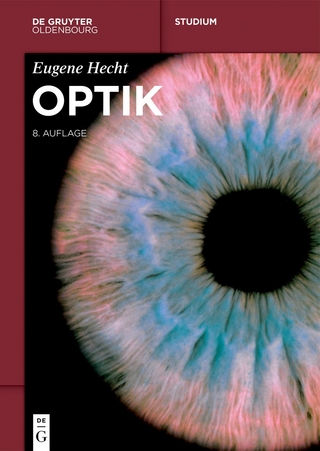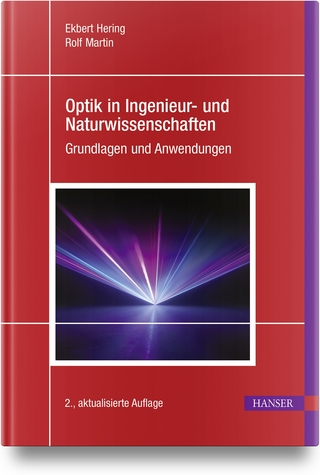
THz Communications
Springer International Publishing (Verlag)
978-3-030-73740-5 (ISBN)
This book describes the fundamentals of THz communications, spanning the whole range of applications, propagation and channel models, RF transceiver technology, antennas, baseband techniques, and networking interfaces. The requested data rate in wireless communications will soon reach from 100 Gbit/s up to 1 Tbps necessitating systems with ultra-high bandwidths of several 10s of GHz which are available only above 200 GHz. In the last decade, research at these frequency bands has made significant progress, enabling mature experimental demonstrations of so-called THz communications, which are thus expected to play a vital role in future wireless networks. In addition to chapters by leading experts on the theory, modeling, and implementation of THz communication technology, the book also features the latest experimental results and addresses standardization and regulatory aspects. This book will be of interest to both academic researchers and engineers in the telecommunications industry.
Thomas Kürner (Fellow IEEE) received his Dipl.-Ing. degree in Electrical Engineering in 1990, and his Dr.-Ing. degree in 1993, both from University of Karlsruhe (Germany). From 1990 to 1994 he was with the Institut für Höchstfrequenztechnik und Elektronik (IHE) at University of Karlsruhe working on propagation modelling and channel characterisation. From 1994 to 2003, he was with the radio network planning department at the headquarters of the mobile operator E-Plus Mobilfunk GmbH & Co KG, Düsseldorf, where he was team manager radio network planning support. Since 2003 he is Full University Professor for Mobile Radio Systems at the Technische Universität Braunschweig working on propagation modelling, channel characterisation, modelling and simulation of wireless networks, car-to-X communications and THz communications. From 2014 to 2017 he has chaired Task Group IEEE 802.15.3d, which standardized the first wireless communication standard operating at 300 GHz. Since 2013 he has coordinated several collaborative research projects on THz communications. Dr. Mittleman received his B.S. from the Massachusetts Institute of Technology in 1988, and his M.S. in 1990 and Ph.D. in 1994, all in physics, from the University of California, Berkeley. He then joined AT&T Bell Laboratories as a post-doctoral member of the technical staff, working first for Dr. Richard Freeman on a terawatt laser system, and then for Dr. Martin Nuss on terahertz spectroscopy and imaging. Dr. Mittleman joined the ECE Department at Rice University in September 1996. In 2015, he moved to the School of Engineering at Brown University . His research interests involve the science and technology of terahertz radiation. He is a Fellow of the OSA, the APS, and the IEEE, and is a 2018 recipient of the Humboldt Research Award. In 2020, he completed a three-year term as Chair of the International Society for Infrared Millimeter and Terahertz Waves. Dr. Nagatsuma received his B.S., M.S., and Ph.D. degrees in electronic engineering from Kyushu University, Fukuoka, Japan, in 1981, 1983, and 1986, respectively. From 1986 to 2007, he was with Nippon Telegraph and Telephone Corporation (NTT), Atsugi, Kanagawa, Japan. Since 2007, he has been with Osaka University, where he is a Professor with the Division of Advanced Electronics and Optical Science, Department of Systems Innovation, Graduate School of Engineering Science. His research interests include millimeter-wave and terahertz photonics and their applications to wireless communications, sensing, and measurement. He is a Fellow of the IEEE, a Fellow of the Institute of Electronics, Information and Communication Engineers (IEICE), Japan. He currently serves as an Associate Editor of the IEEE Photonics Technology Letters and the IEEE Trans. Terahertz Science and Technology, and a Vice President of the IEICE and the Terahertz Systems Consortium.
Chapter 1 Introduction to THz Communications.- Chapter 2 Terahertz Time Domain Spectroscopy (TDS).-Chapter 3 Measurements with Modulated Signals.- Chapter 4 Vector Network Analyzer (VNA).- Chapter 5 Correlation based Channel Sounding.- Chapter 6 Free Space Loss and Atmospheric Effects.- Chapter 7 Reflection, Scattering and Transmission (incl. material parameters).- Chapter 8 Diffraction and Blockage.- Chapter 9 Interference and Noise.- Chapter 10 Indoor Environments.- Chapter 11 Intra-Device and Close-Proximity.- Chapter 12 Backhaul/Fronthaul Outdoor links.- Chapter 13 Smart Rail Mobility.- Chapter 14 Data Centers.- Chapter 15 Vehicular Environments.- Chapter 16 Stochastic Channel Models.- Chapter 17 High-Gain Antennas.- Chapter 18 Antenna Arrays for beam forming.- Chapter 19 Algorithms for Multiple Antennas.- Chapter 20 SiGe HBT.- Chapter 21 Si-CMOS .- Chapter 22 III-V HBT .- Chapter 23 III-V HEMT.- Chapter 24 Resonat Tunelling Diode.- Chapter 25 Plasma-wave device.-Chapter 26 Photonics-based transmitters and receivers.- Chapter 27 Vacuum Electronic Devices.- Chapter 28 Highspeed A/D and D/A.- Chapter 29 Modulation Formats.- Chapter 30 Forward Error Correction at ultra-high data rates.- Chapter 31 MAC and Networking.- Chapter 32 Real100G.- Chapter 33 TERAPAN - A 300 GHz Fixed Wireless Link Based on InGaAs Transmit-Receive MMICs.- Chapter 34 ThoR .- Chapter 35 TERRANOVA.- Chapter 36 Ultrawave.- Chapter 38 Terapod.- Chapter 39 iBrOW.- Chapter 40 120-GHz-band project.- Chapter 41 300-GHz-band InP IC project.-Chapter 42 300-GHz-band Si-CMOS project.- Chapter 43 Fully Electronic Generation and Detection of THz Picosecond Pulses and Their Applications.- Chapter 44 RTD transceiver project.- Chapter 45 Photonics-aided 300-500 GHz wireless communications beyond 300 GHz.- Chapter 46 Ultrabroadband Networking Systems testbed at Northeastern University.- Chapter 47 Photonics-based project at IEMN.-Chapter 48 Opto-electronic generation of high-speed T-wave signals and their reception with a Kramers-Kronig receiver.- Chapter 49 300-GHz-band photonics-based link at ETRI.- Chapter 50 Brown University text bed.- Chapter 51 Activity at New Jersey Institute of Technology (NJIT).- Chapter 52 IEEE Std. 802.15.3d-2017.- Chapter 53 Spectrum for THz Communications.- Chapter 54 Outlook on Standardisation and Regulation.
"Since THz science is multidisciplinary field based on photonics and electronics, this book is addressed to a large audience as an updated account for TBs wireless communications." (Mircea Dragoman, optica-opn.org, May 5, 2022)
“Since THz science is multidisciplinary field based on photonics and electronics, this book is addressed to a large audience as an updated account for TBs wireless communications.” (Mircea Dragoman, optica-opn.org, May 5, 2022)
| Erscheinungsdatum | 10.12.2022 |
|---|---|
| Reihe/Serie | Springer Series in Optical Sciences |
| Zusatzinfo | IX, 531 p. 224 illus., 187 illus. in color. |
| Verlagsort | Cham |
| Sprache | englisch |
| Maße | 155 x 235 mm |
| Gewicht | 814 g |
| Themenwelt | Naturwissenschaften ► Physik / Astronomie ► Optik |
| Technik ► Elektrotechnik / Energietechnik | |
| Technik ► Nachrichtentechnik | |
| Schlagworte | electronic RF front ends • multi-gigabit wireless links • photonic RF front ends • RF transceivers • Terahertz antennas • terahertz communications • terahertz propagation • THz antennas • THz Communications • THz propagation and channel modeling |
| ISBN-10 | 3-030-73740-3 / 3030737403 |
| ISBN-13 | 978-3-030-73740-5 / 9783030737405 |
| Zustand | Neuware |
| Haben Sie eine Frage zum Produkt? |
aus dem Bereich


